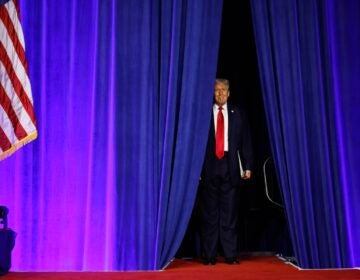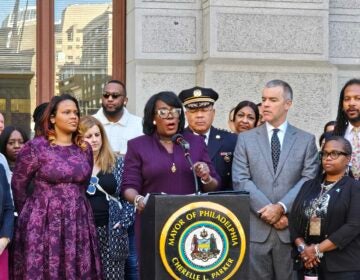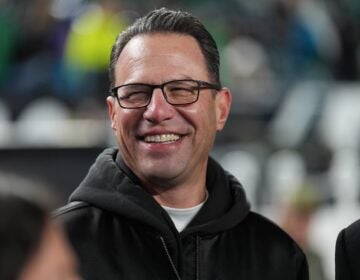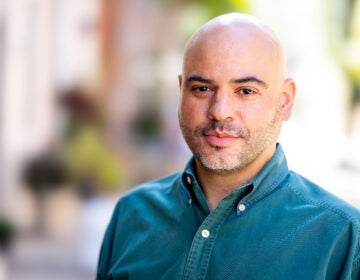Which Philly neighborhoods went for Trump in 2024?
On Election Day, registered Democrats still outnumbered Republicans by a wide margin, but President-elect Donald Trump picked up votes across the city.
Listen 1:10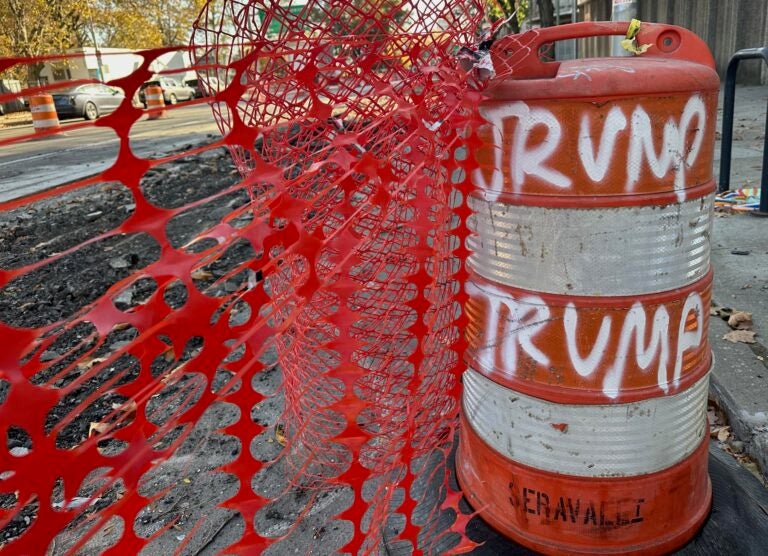
In Center City Philadelphia, a construction marker was spray painted with Trump seen after Election Day 2024. (Kristen Mosbrucker-Garza/WHYY)
From Philly and the Pa. suburbs to South Jersey and Delaware, what would you like WHYY News to cover? Let us know!
When Mary Ann Becker left her polling place in Northeast Philadelphia, she was nervous about the outcome of the presidential election.
As a Catholic, she felt like all that was left for her was to “give it up to God” after casting her ballot for Republican candidate Donald Trump as president, she said.
“It’s too big for me to worry about,” Becker said, donning her “I voted” sticker at William A. Lackman Memorial Playground and Recreation Center.
Becker lives in Philly’s “Trump Country,” where it’s common to see public parks memorializing police officers who died on duty, like the Lackman park.
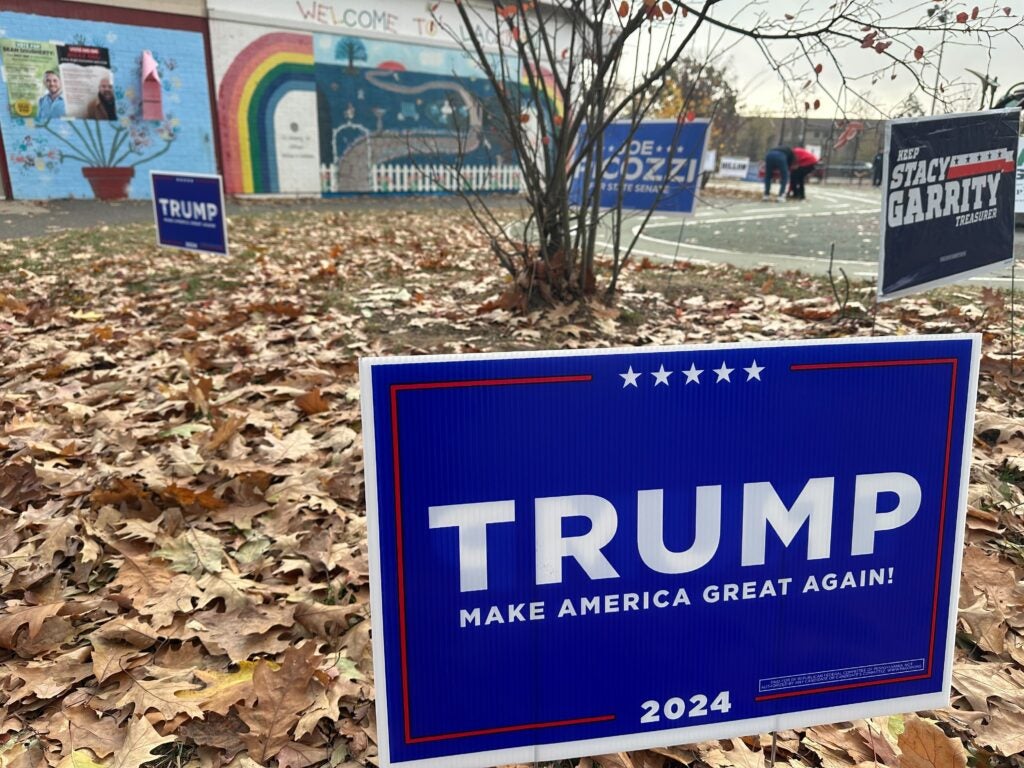
The 75-year-old voter lived most of her life in Port Richmond, about 12 miles south in the River Wards. But four years ago, she moved to Bustleton, where she has a garage instead of competing for street parking, she said.
But there’s some commonalities, both communities are known as Philly enclaves for police officers, firefighters, emergency personnel and other blue collar workers.
Becker’s husband served in law enforcement but has since died. In his memory, she still wears a gold medal pendant with the emblem of the Fraternal Order of Police.
Becker was registered as a Democrat for decades, and technically she’s still a Democrat, according to the most recent voter rolls on file with the state of Pennsylvania downloaded by WHYY News.
She said she tried to change that party affiliation after moving to Bustleton. But on Election Day, poll workers showed her as part of the Democratic Party, and she wasn’t happy about that.
“I said no, no, scratch that [Democratic registration] out,” Becker said.
Across Philadelphia, Trump picked up more than 136,700 votes — including Becker’s — on not just Election Day, but with a combination of mailed and provisional ballots, according to preliminary unofficial voter turnout data when 95% of the divisions were reporting on Nov. 6 downloaded and analyzed by WHYY News.
Now, Trump is president-elect and poised to serve a second term starting in January. He was elected in 2016 but previously lost his re-election bid in 2020.
This year, the Republican won the popular vote not just nationwide, but also in Pennsylvania.
In Philadelphia, there were more than 769,400 registered Democrats and about 125,100 registered Republicans by Nov. 5, according to state voter rolls obtained by WHYY News.
But there are many more voters on the rolls with various affiliations or sometimes no party affiliation, bringing the total number of registered voters in the city to 1 million.
More than 526,900 votes were cast for sitting vice president and presidential Democratic nominee Kamala Harris within city limits, the proprietary analysis shows.
Third party candidate Jill Stein, of the Green Party, had more than 5,600 votes for president in Philadelphia. Libertarian presidential candidate Chase Oliver had roughly 1,200 votes.
The city boundaries mirror Philadelphia County because it’s both a city and county in Pennsylvania. The analyzed data includes mail delivered ballots, provisional ballots and votes cast at the polls.
Voter turnout within city limits was about 60% in 2024 for the presidential election, lower than in 2020, when 66% of registered voters cast ballots, according to the Philadelphia City Commissioners database.
But these results are still unofficial; at the time of data analysis, 95% of divisions had reported results that were downloaded from the city commissioner data dashboard.
The presidential race was called by the Associated Press on Nov. 6 just before 3 a.m.
In 2016, Trump got 108,748 votes in Philadelphia. By 2020, Trump earned 132,870 votes in the city. So his lead in 2024 of roughly 136,700 votes is greater than in the past two presidential elections among city voters.
For Becker, she trusts Trump more than sitting President Joe Biden or Vice President Harris — who has since conceded the general election.
“I think what Trump did for this country the last time he was in office was amazing. We need him for the border, for the economy,” Becker said. “Don’t even get me started. It’s bad overseas. He can stop all of that.”
Becker expressed frustration with what she sees as an unjust system for working families like hers, since food and health care are unaffordable. She highlighted how her daughter and son-in-law pay $1,000 a month for health insurance and regularly get denied coverage at the doctor’s office for medical procedures.
“You can’t afford to go to the store. You come out with two bags of food and it’s $150,” she said.
Presidential elections are always big turnout years, said Philadelphia GOP chairman Vince Fenerty, who has spent five decades observing elections in the city as a committee person.
“It’s a bigger election, people seem to be very opinionated and know who they want to vote for before they get to the polls,” he said.
But most of the time, to be a red dot in a sea of blue like Philly is more lonely.
“We’re outnumbered. To be a Republican within the city limits over the past decade [has] gotten much harder, but we survived,” Fenerty said. “We elect a few people here and there. Being a Republican today, I’m proud. Because it looks like we have made inroads with the election of President Trump and our whole statewide ticket.”
The only Republican on City Council is Brian O’Neill, and he’s been there for decades. O’Neill rarely speaks during council meetings and sometimes introduces legislation for consideration.
“We have Brian O’Neill who is the everlasting stronghold of the Republican Party but I see [the party’s power less strong] in the lower Northeast,” said Fenerty.
But for most Republicans within the city, they are watching communities and their priorities change, Fenerty said.
“It’s difficult to make inroads in some sections of the city, the demographics of the city have changed. It’s become a more liberal and progressive city,” he said. “Our conservative values don’t seem to be accepted well in Philadelphia. But we’re going to continue to fight and gain ground back.”
One of those dedicated voters is 83-year-old Patrick Corey, a registered Republican who cast his ballot for Trump during the general election and regularly volunteers with political campaigns.
Corey was at the polls in Northeast Philadelphia on Election Day at George Washington High School, and his message was short.
“I’m concerned about possibly World War III. I have a grandson in college and I really don’t want to see him go to war,” he said. “We have to have a secure border, bottom line.”
Many registered Republicans living in urban enclaves are older adults who identify as non-Hispanic or Latino and white in the U.S. Census count. However, there were voters leaning toward Trump who are immigrants and identify as Latino.
David Cruz is a small business owner and the child of an immigrant who came to the U.S. in the 1980s. Cruz described himself as an independent voter who chooses specific candidates each election cycle.
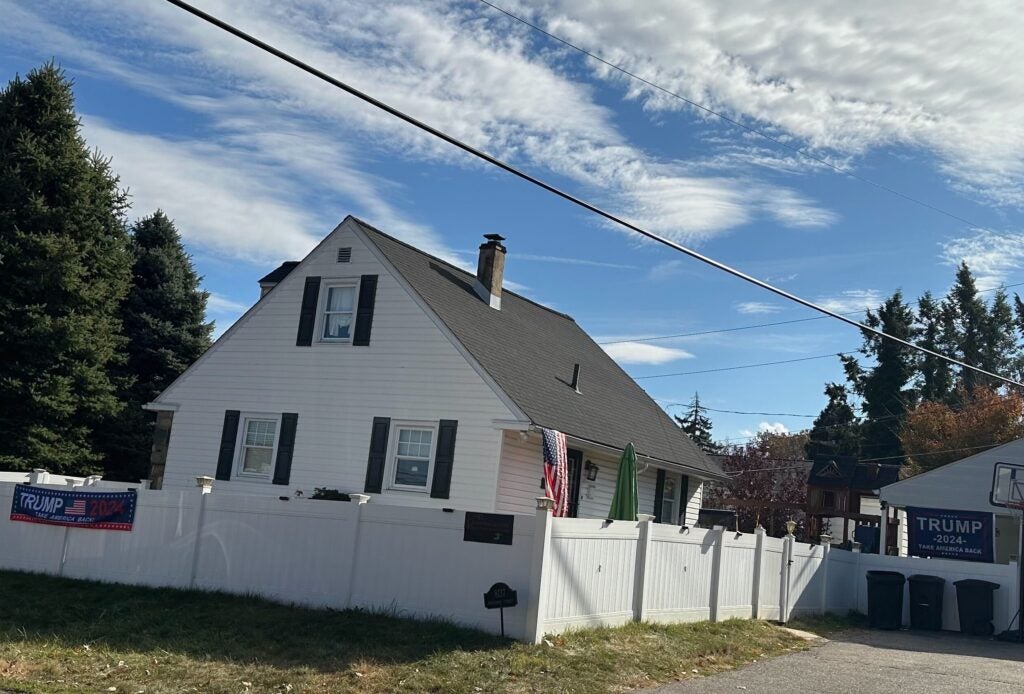
“I’m just a Pennsylvania resident of 49 years, and yeah, I love America,” Cruz said.
Cruz is unaffiliated with a political party, voter records show.
His primary concerns were the economy — particularly inflation and the rising cost of doing business, plus taxes and immigration.
“I’ve been concerned for the last four years [about the] trajectory of the country, where the economy is going, the high taxes,” Cruz said.
His own economic reality — not the overarching national indicators touted by economists — has been especially difficult in the past four years.
“My biggest issue is the economy. It’s hurt my bottom line, it hurt my family. We can’t continue in this environment,” he said.
For example, he blames inflation for an extra $60,000 of unexpected business expenses.
“That’s unbearable. My fuel costs [have] almost doubled in [the] last two years,” he said. “My employees are struggling. I need to increase their wage just so they can sustain their living.”
Beyond that, he’s frustrated with the lack of a comprehensive federal immigration policy beyond providing amnesty to refugees and those seeking asylum.
“The open border, which is very concerning as an immigrant, seeing the immigration laws not being applied,” he said. “As someone that came here and followed the process, I’m seeing the path that the current administration is taking, is [very] concerning, for the next four years.”
And for him, the blame is not the immigrants themselves, but the lack of effective federal government policy.
“My issue is not that immigrants have come over to this country illegally. My issue is that there’s no plan to stop that from happening,” he said.
Cruz said he’s frustrated that there was the same issue dating back to the 1980s when then-president Ronald Reagan signed an immigration reform bill that allowed for sweeping federal amnesty. At the time, Cruz said there was a “promise that the border was going to be secure.” To him, that never happened.
“I’m concerned that my children won’t have the same experience that I had [with a good life], he said. “As someone with a special needs daughter and a child that’s in college currently, I can’t do four more years of this. I honestly just can’t. I’m pretty open to both sides of the argument.”
Cruz said he felt like he “only had one choice” when he went into the voting booth on Election Day because of his life experiences.
He stopped short of explicitly confirming whether he voted for Trump.

Get daily updates from WHYY News!
WHYY is your source for fact-based, in-depth journalism and information. As a nonprofit organization, we rely on financial support from readers like you. Please give today.


